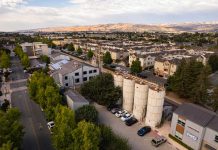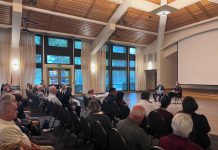On Saturday, April 29, the city held its “capstone” event concluding the input portion of the Community Conversation – the year-long project to determine what Morgan Hill residents want to keep, change or are willing to do without – along with how these things should be paid for.
A lot of effort went into the conversation. City staff was tasked with the coordination of presenters, consultants and the meetings themselves, 26 of them that constituted the conversation.
Many have claimed the outcome of the process was pre-ordained. It’s true, many of the questions were leading in their nature, but by and large, I feel the altruistic goodwill towards the city will outweigh any political agendas.
During his 1972 race for re-election, then President Nixon used to speak of the “silent majority,” and how they would keep him in office despite his then-growing credibility concerns. The best bumper sticker of the era was one that said, “The Majority is not Silent, The Government is Deaf!”
This highway missive is half correct as it applies to the Community Conversation: yes, the majority is silent; No the government is not deaf. Here’s why:
During the capstone event, City Manager Ed Tewes proudly stated that 330 people showed up for the 26 conversations. I’m sure his numbers are accurate. Even accounting for the fact that many people went to multiple conversations, which would reduce that number to closer to 300, isn’t a bunch of folks for a City of 35,000. That’s an average of 12.69 people per conversation, using Tewes’ numbers, plus two facilitators. That’s not a community conversation, that’s a very private chat.
At a recent Morgan Hill Chamber of Commerce breakfast, Tewes repeated the same figures adding the euphemism, “Overwhelmingly successful.” Three- hundred, thirty people represent .0094 percent of Morgan Hill’s population. Perhaps if we had reached 500 participants Tewes could have referred to the .0142 percent as, “insanely overwhelming!” If the number were 1,000 participants or 2.8 percent of the population, I’d now be visiting Tewes in intensive care as he recovered from near-fatal hyperventilation.
Granted, national and state polls feel that 1 percent is an adequate sampling to achieve sufficient information for the necessary conclusion. It’s tough on the city because happy people, by nature, tend to be apathetic.
There has been approximately $100,000 spent in staff time and consultants on the process. (Refreshments were provided by the hosts.) That’s $303.03 per respondent.
The reason for the overwhelming lack of response: credibility. When first announced a year ago, I was sitting at another Chamber breakfast with nine others. In front of each of us on the table was a sheet describing what was to come. I personally applauded the effort but I felt insecure as to the process. I have since come to commend the same process – but not it’s results. The purpose of the sheet was to get participants. Everyone at the table put their sheet down and went about their business. I asked, “Why?” “They’re going to do what they want anyway,” was the almost-in-unison answer.
I attempted to approach a couple of our elected types to share my experience. They were already swimming in that river in Africa, de Nile. (Not all these guys can swim.)
My well-intended solution: Learn from this experience and move on. People are not showing up in droves because they don’t want to waste their time with motions, intentions and little result. You meant well but it didn’t work. I well understand how difficult it is to get good volunteers consistently. Sixteen years of organizing the Fourth of July in this community is a strong teacher. But it can be done – with credibility.
If the city council acts on the recommendation of .0094 percent of the population – please think again. Those five have a tremendous burden on their shoulders. Don’t make it worse by acting on incomplete and, perhaps, inaccurate indications by a few well-meaning folks. Work hard to build and maintain a cadre of community volunteers that will remain ready, willing and able to be your eyes and ears for years to come.
The time may not be ripe for a tax increase for the above concern but also because of the county’s half-cent sales tax request, the parcel tax proposal from the school district plus the yet-to-be-announced state bond measure.
Alex Kennett is a retired U.S. Army lieutenant colonel and has been active in community affairs for more than two decades.







